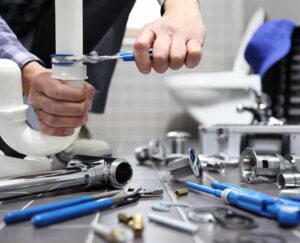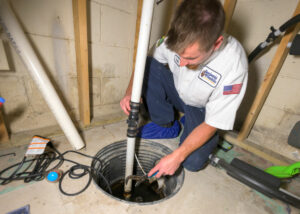How Can You Tell? (Before It’s Too Late)
Let me guess – you don’t think about your sump pump much, right? None of us do… until we’re ankle-deep in water wondering what went wrong. I’ve seen it countless times around Richmond homeowners discovering their sump pump failed only when they notice their basement carpet floating like a sad, soggy raft. By then, you’re facing water damage, potential mold, and a repair bill that makes your eye twitch.
At Benjamin Franklin Plumbing, we’re what you might call stubbornly honest plumbers. We won’t try to scare you into replacing something that works fine, but we also won’t sugarcoat it when your pump is circling the drain. Let me walk you through the warning signs that might save your basement (and your wallet) from a watery disaster.
The Red Flags: Signs Your Sump Pump Is Crying for Help
1. Strange Noises That Weren’t There Before
A healthy sump pump has a consistent, relatively quiet hum. It’s not silent, but it shouldn’t sound like you’re running a blender full of pennies either. If yours starts making strange sounds – grinding, rattling, banging, or high-pitched squealing – something’s wrong.
Those noises usually mean internal components are worn out or damaged. Maybe the bearings are shot, the impeller is bent, or the motor’s starting to give out. Whatever it is, those sounds are your pump’s way of saying “Hey, I need some attention here!”
2. It’s Running a Marathon When It Should Be Sprinting
Your pump should kick on when water rises, do its job, and then shut off. Simple cycle. If it’s running constantly, even when there’s no water to pump, something’s not right.
This could be a stuck float switch that thinks the water level is always high, or a failed check valve letting water flow back into the pit (forcing your pump to move the same water over and over). Either way, that non-stop operation burns out motors fast – meaning a replacement is in your near future.
3. The Silent Treatment (When It Should Be Working)
This one’s scary – water’s rising in the pit, but your pump is completely silent. No humming, no pumping, nothing. Maybe it’s an electrical issue, maybe the motor’s dead, or perhaps the switch failed. Whatever the cause, this is the worst time to discover your basement’s first line of defense isn’t working.
4. It’s Acting Like It Has a Nervous Twitch
If your pump turns on and off rapidly in quick succession (what we call “short cycling”), that’s bad news. This usually happens when the float switch is malfunctioning or your basin is too small for your water table. That constant on-off cycling is brutal on the motor and electrical components, dramatically shortening your pump’s lifespan.
5. It’s Doing the Shake, Rattle and Roll
A properly installed sump pump should sit steady in its pit. If it vibrates excessively or moves around when running, something’s loose or out of balance – often a bent impeller or damaged motor mount. That movement stresses the entire system, from the housing to the discharge pipe, potentially causing leaks or disconnections.
6. It’s Showing Its Age (Visibly)
Grab a flashlight and take a look at your pump. See rust, flaking metal, or orange stains? That corrosion isn’t just cosmetic – it’s weakening the pump body and probably affecting internal components too. Water and metal don’t mix well long-term, and that rust is telling you time is running out.
7. Your Basement Smells Like an Old Swamp
Sometimes, your nose knows first. If you’re picking up musty, mildewy, or stagnant water smells in your basement despite no visible flooding, your pump might not be clearing water properly. That persistent dampness creates the perfect environment for mold and that unmistakable basement funk.
When to Pick Up the Phone and Call Us
Don’t wait for disaster to strike. If you notice any of these warning signs – or even if you just have a gut feeling something’s wrong – it’s time to call the professionals.
Give Benjamin Franklin Plumbing a call if:
- Your pump is over 7 years old (they don’t last forever)
- It’s running too frequently or not at all
- You’ve had even minor water issues in the past
- Your backup system failed during the last power outage
- Storm season is approaching and you haven’t tested your system
- You’re not sure how old your pump is (new homeowner special!)
We know Richmond’s weather patterns and the kind of storms that roll through here. We’ve seen the aftermath when sump pumps fail during those summer thunderstorms, and trust me – prevention is much cheaper than restoration.
What to Expect When We Service Your Sump Pump
When we come to check your system, we don’t just poke it with a stick and call it a day.
Our thorough inspection includes:
- A conversation about what you’ve noticed – your observations help us diagnose the problem faster
- Float and switch testing – we manually trigger the system to see if it responds correctly
- Real-world simulation – we add water to the pit to test how the pump handles actual work
- Check valve and discharge line inspection – sometimes the pump is fine, but water can’t escape
- A full damage assessment – we look for corrosion, cracks, electrical issues, and other red flags
- Honest recommendations – if it needs repair or replacement, we’ll explain why in plain English
Quick Answers to Common Questions
How long should my sump pump last?
Most pumps give you 7-10 good years, depending on how hard they work and how well they’re maintained.
Is a backup pump really necessary?
If you live in an area with frequent storms or power outages (hello, Richmond summers!), absolutely yes. A backup pump can be the difference between a dry basement and thousands in water damage.
Can I just test the pump myself?
You can do a basic check by lifting the float, but that only tells you if it turns on—not how well it pumps or if the discharge system works properly.
What does a burning smell mean?
Turn off your pump immediately! That smell usually means the motor is overheating, which can create a fire hazard or destroy the pump entirely.
Don’t Wait for Disaster to Call
Sump pump problems never improve on their own, and the first sign of failure shouldn’t be water soaking your belongings. At Benjamin Franklin Plumbing, we specialize in fixing these issues before they become emergencies.
We’re punctual, thorough, and most importantly, honest about what we find. Whether your pump needs a simple fix or it’s time for a replacement, you’ll get the straight facts with no pressure tactics.
So if you’re noticing any of these warning signs, or if your pump hasn’t been checked in years, give us a call. Your dry basement (and future self) will thank you.
